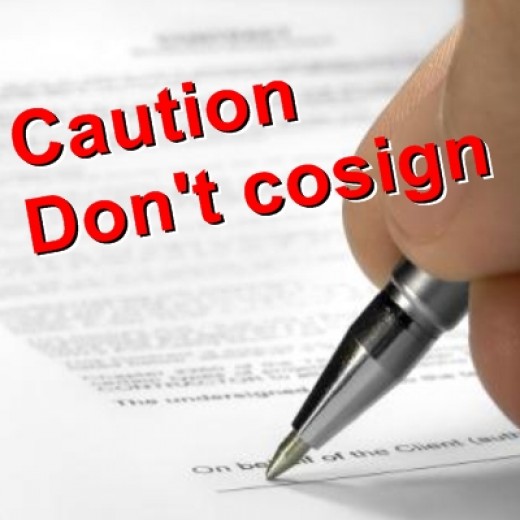5 Dangers of Co-Signing
The co-signing story always begins the same way. Your child, your favorite nephew, your cousin, or your boyfriend or girlfriend asks you for a favor which goes along the lines of, “the bank says I need a co-signer… will you co-sign?” If you don’t already know where this is headed, read on.
The truth is no matter how much you care about the person who is asking you the co-signing question, it is a dangerous proposition. And, if a bank or an apartment complex or a credit card issuer isn’t willing to do business with someone on their own, do you really want to hitch your credit report to their credit reputation?
- You are equally responsible for the debt.
When you co-sign for a financial obligation you become a co-borrower for the debt. The more formal term is a co-obligor. In the event that your co-signer fails to pay back the debt according to the terms of the agreement you will personally be held responsible – no ifs, ands, or buts about it. Despite a lot of misinformation on the topic, there is no such thing as co-signing for a loan or credit card without being equally liable for the debt.
- You are taking on a risk that a lender believes is unwise.
When a lender requires a co-signer it is due to the fact that the lender is uncomfortable with the risk associated with loaning money to a particular applicant. Whether it be due to financial overextension or a damaged credit history, the lender does not believe that loaning money to the applicant is a smart investment. Therefore, if you agree to co-sign for someone you are in reality taking on a risk which a lender has judged to be unwise.
- Your credit could be destroyed.
Perhaps the biggest risk you take on when you co-sign is the risk of damaging your personal credit. If your co-signer fails to make payments in a timely fashion those late payments will show up on your personal credit reports shortly thereafter. A series of late payments or, worse, a default could send your credit scores in a downward spiral which could take years to fully recover from.
Even if your co-signer never makes a late payment, the debt you co-signed for could still impact your credit scores negatively. This is especially true of credit cards where the mere act of running up a large balance can damage you credit scores.
- You could have DTI problems in the future.
When you co-sign for someone else you could be reducing the amount of money you are eligible to borrow for yourself in the future. Lenders, most notably mortgage lenders, often consider your current debt-to-income (DTI) ratio whenever you apply for new financing. Any debts for which you have co-signed are generally counted against your DTI. If a lender feels like a new loan would overextend you financially then your application for a new mortgage, auto loan, personal loan, etc. could be denied.
- Your relationship could be damaged.
Many people fail to consider the damage co-signing can potentially inflict upon your relationships. Co-signing for a loan means you are making a commitment which will last many years. If you co-sign for a credit card the commitment does not have a specific end date. Consider how you would feel if your friend or family member failed to manage the debt for which you co-signed in a responsible fashion.
If your credit is destroyed as a result of your loved one’s poor payment habits, would it put a strain on the relationship? The answer to this question is usually yes, even if you care for your loved one deeply. The risk to your relationships introduces another important reason why co-signing should generally be avoided. The multitude of risks to which you are exposing yourself is simply too great to ignore.

